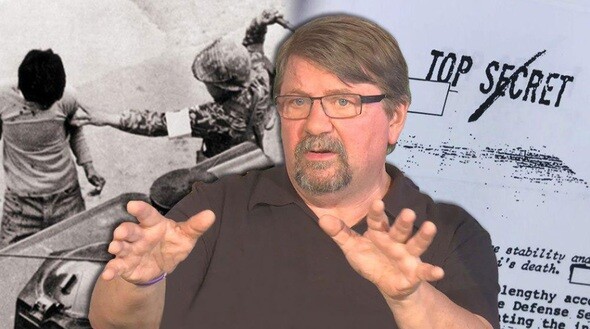hankyoreh
Links to other country sites 다른 나라 사이트 링크
American investigative journalist highlights US role in suppression of Korean democracy movements

“After examining the Jeju Uprising in the 1940s and the Gwangju Uprising in 1980, I was shocked at how similar they were despite the passage of over three decades in between. The Jeju Uprising [starting on Apr. 3, 1948] was an armed struggle against the US military administration formed in South Korea, while the Gwangju Uprising [starting on May 18, 1980] was an armed struggle against a South Korean military administration backed by the US, so you can see the commonalities in terms of the US’s involvement with the forces behind the suppression.”
Tim Shorrock, a US journalist specializing in investigative reporting, was speaking at a June 28 panel discussion sponsored by Jeju Island and organized by the Jeju 4/3 Research Institute on the topic “April 3: State Violence and Memory.” Shorrock has been covering Korean Peninsula issues since the 1970s was named an honorary citizen of Gwangju for his reporting uncovering secret US government documents in connection with the Gwangju Uprising.
In a presentation on the topic “The Jeju and Gwangju Uprisings as Seen by a US Reporter,” Shorrock explained, “With both the Jeju Uprising and the Gwangju Uprising in 1980, the US supported a massacre operation by suppression forces, with the Jeju situation in particular being a suppression operation organized and orchestrated by the US from the beginning.”
Shorrock explained that he had reached his conclusion “after over 30 years of investigating and writing about the Jeju Uprising following the Gwangju Democracy Movement in 1980.”
“The most important similarity is the role played by the US in the suppression of both uprisings,” he said.
“If you look at ‘History of Jeju,’ a collection of papers on the uprising, the US military government used the incident strategically, classifying Jeju as a ‘Red island’ after the general strike and protests that followed the police firing on residents on Mar. 1, 1947,” Shorrock explained.
“They portrayed 70 percent of Jeju residents as communists or communist collaborators,” he added.
“During the suppression of the Jeju Uprising, the US military government assumed a direct role beyond just involvement through the South Korean military and police,” he continued.
Shorrock went on to say that the “shadow lurking behind the suppression of the Jeju Uprising is the US military administration that directly ordered the subjugation.”
“In contrast, the hidden shadow with the Gwangju incident was the US [Jimmy] Carter administration’s decision to respond militarily to an uprising against the Chun Doo-hwan administration’s martial law decree,” he added.
“The roles of the US in the Jeju and Gwangju Uprisings were clearly different, but the results were similar,” Shorrock said.
“The people of South Korea and the US need to continue investigating these relationships and fully disclose the role of the US at the time of the Jeju and Gwangju Uprisings in the interests of justice and reconciliation,” he suggested.
“I hope activities like these can contribute to South Korea-US relations,” he added.
Since October of last year, the Pan-National Committee for the 70th Anniversary of Jeju April 3 has been campaigning to collect 100,000 signatures calling for “responsible action from the US and UN on the Jeju Uprising.”
By Kwon Hyuk-chul, staff staff writer
Please direct comments or questions to [english@hani.co.kr]

Editorial・opinion
![[Column] Has Korea, too, crossed the Rubicon on China? [Column] Has Korea, too, crossed the Rubicon on China?](https://flexible.img.hani.co.kr/flexible/normal/500/300/imgdb/original/2024/0419/9317135153409185.jpg) [Column] Has Korea, too, crossed the Rubicon on China?
[Column] Has Korea, too, crossed the Rubicon on China?![[Correspondent’s column] In Japan’s alliance with US, echoes of its past alliances with UK [Correspondent’s column] In Japan’s alliance with US, echoes of its past alliances with UK](https://flexible.img.hani.co.kr/flexible/normal/500/300/imgdb/original/2024/0419/2317135166563519.jpg) [Correspondent’s column] In Japan’s alliance with US, echoes of its past alliances with UK
[Correspondent’s column] In Japan’s alliance with US, echoes of its past alliances with UK- [Editorial] Does Yoon think the Korean public is wrong?
- [Editorial] As it bolsters its alliance with US, Japan must be accountable for past
- [Guest essay] Amending the Constitution is Yoon’s key to leaving office in public’s good graces
- [Editorial] 10 years on, lessons of Sewol tragedy must never be forgotten
- [Column] A death blow to Korea’s prosecutor politics
- [Correspondent’s column] The US and the end of Japanese pacifism
- [Guest essay] How Korea turned its trainee doctors into monsters
- [Guest essay] As someone who helped forge Seoul-Moscow ties, their status today troubles me
Most viewed articles
- 1[Column] The clock is ticking for Korea’s first lady
- 2[Correspondent’s column] In Japan’s alliance with US, echoes of its past alliances with UK
- 3Samsung barricades office as unionized workers strike for better conditions
- 4After 2 months of delayed, denied medical care, Koreans worry worst may be yet to come
- 5[Column] Has Korea, too, crossed the Rubicon on China?
- 6[Editorial] When the choice is kids or career, Korea will never overcome birth rate woes
- 7Hong Se-hwa, voice for tolerance whose memoir of exile touched a chord, dies at 76
- 8US overtakes China as Korea’s top export market, prompting trade sanction jitters
- 9Constitutional Court rules to disband left-wing Unified Progressive Party
- 10Nearly 1 in 5 N. Korean defectors say they regret coming to S. Korea